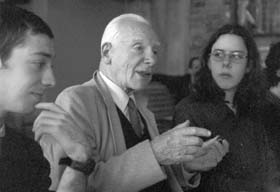
| ||
 | ||
 Joseph Rotblat, co-founder of the Pugwash Movement with McGill Student Pugwash members Tom Bell and Sinéad Collins PHOTO: OWEN EGAN |
Rotblat's message
|
SYLVAIN COMEAU | Fifty-four years after abandoning the Manhattan Project, 1995 Nobel Peace Prize Laureate Joseph Rotblat is still fighting for a nuclear-free world. In a lecture at McGill last Wednesday, Rotblat looked back on the 20th century, a century unique in its unprecedented threats to human survival.
"Science is largely responsible for the benefits to mankind in this century, but also for much of the dangers we face. Because of nuclear warheads, the future of the human race cannot be guaranteed. Our species is now an endangered species." He reminded a generation that has seen the passing of the cold war that humanity has, in the past, come within a hair of nuclear war. "On several occasions, we came close to the actual use (of nuclear missiles). I'll never forget one of them, the Cuban missile crisis, in which the human race's fate depended on the decisions of one man. Thankfully, (Soviet president) Khrushchev was a sane man. We might not be so lucky the next time." Rotblat is a co-founder and former president of the Pugwash Conferences on Science and World Affairs. Pugwash conferences are held annually to examine the dangers of armed conflict. Scientists are asked to examine the ethical issues raised by their work. Pugwash conferences have been credited with inspiring, among other initiatives, the Nuclear Non-Proliferation Treaty of 1968, the Biological Weapons Treaty of 1972 and the Chemical Weapons Convention of 1993. Rotblat, who is president emeritus of the London headquarters of Pugwash, is equally famous for his participation in developing the atom bomb, then walking away as perhaps the first nuclear protester. In 1939, Rotblat worked with James Chadwick, discoverer of the neutron, at Liverpool University. He then worked for the Manhattan Project, the American initiative to create the atomic bomb. He decided to leave that project in 1944. During his lecture, Rotblat offered an inside view on his, and other scientists', reasoning at the time. "Early in 1939, when I and other scientists came to understand the huge amounts of energy released by nuclear reactions, we also understood that this could be used to create an atom bomb. I wanted to put that idea out of my mind, but I knew that other scientists would not have the same scruples." He chose to work on the bomb out of his belief in the principle of deterrence. "We reasoned that, once the bomb was developed by other nations, the only way to stop nations from using it would be to have it ourselves." But Rotblat learned that the Americans were looking further ahead than World War II, and were already planning for the cold war. They wanted the bomb "to subdue the Russians," in the words of American general Leslie Groves, not so much to fight Germany. But the clincher was news coming from Germany. "At that time (the end of 1944), large parts of Germany were already occupied by the allied forces and many senior scientists were interned. Therefore, we had intelligence information that the Germans had ceased to work on the bomb. They had decided that it was impractical and it would weigh tons. As soon as I learned that, I packed my bags and left Los Alamos." Rotblat says now that even deterrence, his original motivation for working on the project despite his misgivings, was not reason enough. "Deterrence only works with a rational man -- someone who understands and respects the fact that actions have consequences. It doesn't work with a madman. I am convinced now that if Hitler had had the atom bomb, his last order from his bunker would have been to drop the bomb on London, regardless of the consequences for Germany." Rotblat says that the world has gone the wrong way in its efforts to grapple with the spectre of war. "Inspired by the motto 'If you want peace, prepare for war,' the world has followed a slightly different dictum: 'If you want peace, be armed to the teeth.' Because we believe this, of course we have had many wars. If you have weapons, you will use them eventually." "We need a better motto: 'If you want peace, prepare for peace.'" As one of the first steps toward this goal, Rotblat called for complete disarmament. He says that the widespread availability of nukes in the post-cold war world makes deterrence nearly irrelevant. "We feel it is urgent to eliminate all nuclear weapons. Nowadays, a large amount of nuclear material, especially in Russia, is not fully controlled. There are many opportunities for terrorist groups or rogue nations to acquire such a weapon. If such a group or nation used it to blackmail the rest of the world, all the thousands of nuclear weapons in the arsenals would be completely useless to deal with such a threat. The only solution is to get rid of all these weapons." As for his fellow scientists, Rotblat called on them to temper the thrill of discovery with an ethical vigilance. "We hope that scientists around the world will refuse to work on weapons of mass destruction... Perhaps scientists should adopt a code of conduct, something like the Hippocratic Oath. Doctors take the Hippocratic Oath because of their responsibility; the life of the patient rests in the hands of the doctor. Nowadays, the whole of humanity is in danger and the scientist is the doctor." The lecture was organized by the Dean of Science, as well as McGill Student Pugwash, the Science Undergraduate Society and the Physics Department.
|
|
| |||||